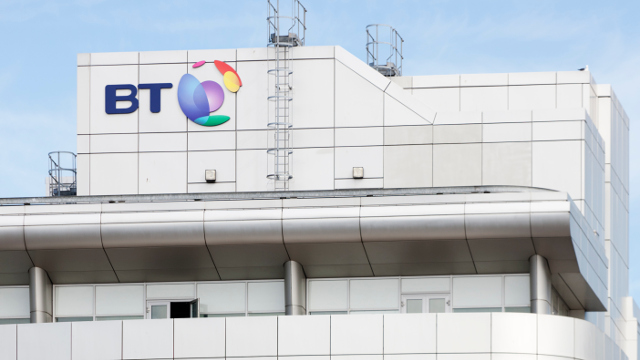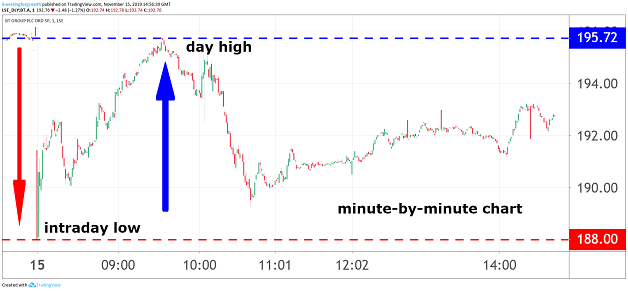BT shares fall on Labour plans to nationalise BT Openreach
As parties continue to drip-feed election promises, Labour has dealt BT a low blow.
15th November 2019 15:27
by Gary McFarlane from interactive investor
As parties continue to drip-feed election promises, Labour has dealt BT a low blow.

The Labour Party is proposing to nationalise BT (LSE:BT.A) Openreach in an unexpected election announcement that has taken the stock market by surprise.
BT Openreach is the telecom giant's infrastructure division responsible for rolling out its high-speed broadband network across the UK.
The party plans for its new publicly owned British Broadband to be free to all households and businesses.
Known as "full-fibre", BT Openreach high-speed network uses fibre optics rather than copper, or a combination of copper and fibre, to deliver data speeds far in excess of the 20 to 30 Megabits currently accessed by most households.
However, rollout progress has been slow.
According to industry group, Fibre To The Home Council Europe, the UK was ranked bottom in March 2019 for household penetration at a lowly 1.5%, with Latvia top on 50.3%, Spain on 44% and the Netherlands 22%; the European Union average came in at 13.9%.
Telecoms regulator Ofcom says UK full-fibre penetration for households and businesses is currently around 7%. Full-fibre offers speeds of 1,000 Megabits per second (Mbps) (1 Gigabit) and theoretically could be upgraded to as much as 1,000 Gigabits.

Source: TradingView Past performance is not a guide to future performance
The current government is already committed to spending £5 billion to rollout the technology to areas of the country that would otherwise be uneconomic to connect, such as remote rural locations.
Labour, for its part, says it will add an extra £15 billion to the £5 billion already earmarked for broadband in its proposed Green Transformation Fund. The party says it will tax big tech companies such as Amazon (NASDAQ:AMZN), Google (NASDAQ:GOOGL) and Apple (NASDAQ:AAPL) to help pay for the network buildout, which it reckons will take 10 years.
In comments provided to the BBC, shadow chancellor John McDonnell said the policy was "visionary" and would increase productivity across the economy, but prime minister Boris Johnson described it as a "crackpot" idea.
Joshua Mahony, senior market analyst at broker IG, worries that the move could have wider implications for the broadband industry. "This proposal has a wide reach that would essentially wipe out the whole broadband business in the UK," he warns.
BT competitors such as Virgin Media, which offers the most extensive fibre service in the UK, could also find their businesses products undercut by the publicly owned broadband entity.
The eye-catching announcement saw the BT share price initially fall 4%; it is currently trading 1.57% lower as shareholders worry that the policy would see them lose out. McDonnell says the price the state would pay for the shares would be decided by parliament, notably with no commitment to pay the market rate.
The share price recovery probably reflects a wider view among investors that a majority Labour government is unlikely to be elected.
Richard Hunter, head of markets at interactive investor, concurs:
"The likelihood of a Labour victory is viewed as slim, and the complexity of the costings, let alone the effects on the army of shareholders who currently hold the stock directly or indirectly via pension schemes, is unclear. The BT CEO has euphemistically described the proposals as "ambitious" and only a late surge in the polls towards Labour would reignite any concerns."
BT says that the Labour Party's costing for the nationalisation is unrealistically low, with the figure more likely to be nearer £100 billion.
BT chief executive Philip Jansen, reacting to the news with notably even-handed language given the ongoing election campaign, said: "These are very, very ambitious ideas and the Conservative Party have their own ambitious idea for full fibre for everyone by 2025, and how we do it is not straightforward."
These articles are provided for information purposes only. Occasionally, an opinion about whether to buy or sell a specific investment may be provided by third parties. The content is not intended to be a personal recommendation to buy or sell any financial instrument or product, or to adopt any investment strategy as it is not provided based on an assessment of your investing knowledge and experience, your financial situation or your investment objectives. The value of your investments, and the income derived from them, may go down as well as up. You may not get back all the money that you invest. The investments referred to in this article may not be suitable for all investors, and if in doubt, an investor should seek advice from a qualified investment adviser.
Full performance can be found on the company or index summary page on the interactive investor website. Simply click on the company's or index name highlighted in the article.